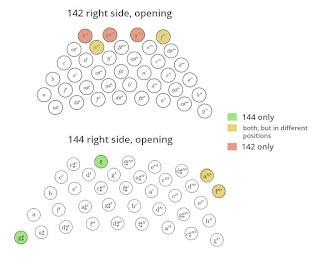As the readers of this blog know, I play bandoneon 144 and actually I play the same scores playable by the 142 system, and furthermore I'm studying at Buenos Aires, the "temple" of the 142 bandoneon. All this demonstrates that 144 system IS playable at least as well as 142, and is just habit that make people prefer the 142.
Showing posts with label 142 bandoneon. Show all posts
Showing posts with label 142 bandoneon. Show all posts
Wednesday, 7 August 2019
Tuesday, 16 July 2019
142 and 144 keyboards comparison
Some people asked me for a comparison between keyboards in 142 and144 system. So, here you have:
 |
| Right side, opening |
 |
| Right side, closing |
 |
| Left side, opening |
 |
| Left side, closing |
You can download all the 4 diagrams in PDF format.
Monday, 17 October 2016
Chromatic and Diatonic Bandoneons: really sound different?
If you want to play bandonion and you are in search for an instrument, probably you will read in some blogs or forums that the only way to get THAT sound is to buy a 142 bisonoric instrument, and no other versions of the bandonion's layout can provide you such a colourful sound.
Well, right this summer I attended a music stage with french bandoneon master Olivier Manoury. He plays chromatic bandonion, and hearing him I realized that a chromatic bandonion sounds great exactly as a diatonic one, when you are good enough to play bandonion.
So, do not give too much attention to those who say you have to buy a 142 Rheinische bandoneon OR you will not have that sound and you will never play real tango or real bandonion. Everyone feathers one's own nest. Chromatic bandoneon sounds great exactly as any other 142 bandoneon, if you are able enough to handle it giving expression with bellows and weight pressure. You should decide with which layout playing according to instrument availability, budget, experience and your personal attitude.
And what about 144 bandonions?
Generally these instruments were built for German Folk music, and thanks to a third reeds row they are tuned with "vibrato". But you can silence the third row and tune the remaining 2 reeds at perfect octave, et voilà you have a 142 bandoneon sound like.
Labels:
142 bandoneon,
2016,
bandoneon,
bisonoric bandoneon,
chromatic bandonion,
olivier manoury,
peguri bandoneon,
rheinische tonlage,
stage bandoneon,
unisonoric bandoneon
Location:
22036 Erba CO, Italia
Sunday, 24 July 2016
The Bandoneon Range of notes
Bandoneon is a nice instrument because in a small "box" you have an unexpected extension: in the 33/38 Rheinische Tonlage the left side (bass side) starts from C2 and reaches up B4 (3 octaves), while the right side ("singing" side) starts from A3 to B6 (3 octaves again).
The 2 sides extensions partially overlap, for a total extension of almost 5 octaves. Not bad for a little squeeze box!
Let's see a comparison with some musical instruments in the next infographics:
And what about 144 tones Bandoneons?
The 144 bass side of 144 models also starts from C2, and arrives up to A#4, while on right side it starts from G3 and reaches up to A6.
The range of 144 is slightly less than 142 model, but the total extension is sacrificed in favor of a more coherent keyboard, in fact chromatically complete for both opening and closing.
Subscribe to:
Posts (Atom)


